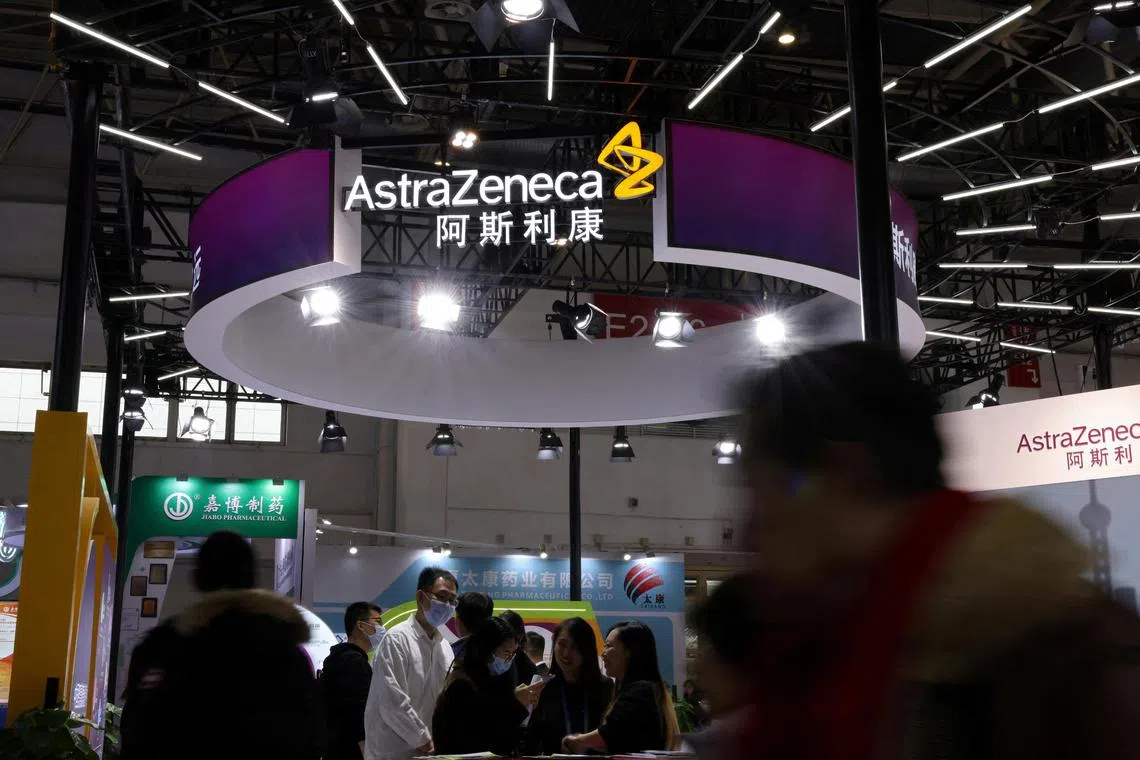Drug giants eye China for deals, despite growing Sino-US tensions
Sign up now: Get ST's newsletters delivered to your inbox

Several major deals have already been completed in 2024, including AstraZeneca’s US$1.2 billion purchase of China-based cell therapy developer Gracell Biotechnologies.
PHOTO: REUTERS
SHANGHAI/HONG KONG - Some of the biggest global drugmakers, undeterred by mounting Sino-US tensions, are scouring for deals in China to replenish drug pipelines and boost their presence in the world’s second-biggest pharmaceutical market, industry executives and investment bankers said.
Several major deals have already been completed in 2024, including AstraZeneca’s US$1.2 billion (S$1.6 billion) purchase of China-based cell therapy developer Gracell Biotechnologies and Novartis’ acquisition of remaining shares of kidney disease therapy developer SanReno Therapeutics for an undisclosed amount.
Bristol Myers Squibb and Sanofi are also hunting for deals, according to company employees, even as some rivals have looked to exit China in the wake of Covid-19-related supply chain disruptions, a local economic slowdown and price cuts to get state insurance listing.
The foreign interest in Chinese drugmakers is a blessing for struggling local companies and weary investors eager to cash out on their investments as regulators tighten initial public offering rules, putting pressure on businesses that have faced difficulty in raising cash to support their research work.
Mr Manas Chawla, chief executive of global political risk advisory firm London Politica, which has worked with multinational pharmaceutical clients, said acquisitions would help them bring down costs, tap into innovative companies and get exposure to China’s large consumer market.
But it is not without risk, he said.
“Hawkishness on China is a form of rare bipartisan consensus (in the US),” he added.
The majority of buyers of Chinese healthcare companies have been domestic in the past two decades, London Stock Exchange Group data showed.
Announced acquisitions of Chinese healthcare companies totalled US$6.8 billion as at July 16, the lowest in a decade for the same period, the data showed.
Among them, foreign acquisitions accounted for US$720 million in value, down 52 per cent year on year, according to the data.
Bristol Myers Squibb, which faces challenges from patent expiries, is looking for “bolt-on opportunities”, said business development head Liang Wu at a meeting of the Chinese Biopharmaceutical Association – USA in Suzhou in late June.
She said one of its interests in China is antibody-drug conjugate, a cancer drug combining targeted therapy and chemotherapy. It currently has an agreement to develop and commercialise one of Chinese drugmaker Sichuan Biokin Pharmaceutical’s antibody-drug conjugates outside the country.
Sanofi product planning manager Wei Wei said buying biotechnology companies in China was a goal for the French drugmaker and had been discussed in meetings.
China risks
Aspen Pharmacare’s China chief executive Larry Merizalde said the South African company – which in December announced that it had agreed to buy Swiss group Sandoz’s China unit – is expanding in other markets to balance China risk while continuing to scout for Chinese assets.
China accounted for about 10 per cent of Aspen’s global revenue, Mr Merizalde said before the Sandoz deal was announced, but it is only one of the dozens of countries where Africa’s biggest pharmaceutical company operates.
“I think there are risks” in China, Mr Merizalde said.
“I think that if there is any major conflict or there is any major economic downturn, we will be impacted, because any of those issues will impact the overall pharmaceutical market, so we manage those risks as a company.” REUTERS


